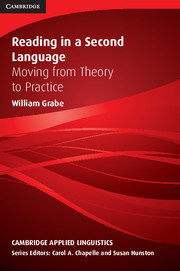Book contents
- Frontmatter
- Contents
- Series editors' preface
- Preface
- I FOUNDATIONS OF READING
- II PATTERNS OF VARIATION IN READING
- Chapter 6 Reading in different languages
- Chapter 7 L1 and L2 reading relationships
- Chapter 8 The social contexts of reading
- Chapter 9 Motivation for reading
- III DEVELOPING READING COMPREHENSION ABILITIES
- IV EXPANDING READING COMPREHENSION SKILLS
- References
- Author Index
- Subject Index
Chapter 9 - Motivation for reading
from II - PATTERNS OF VARIATION IN READING
Published online by Cambridge University Press: 05 August 2012
- Frontmatter
- Contents
- Series editors' preface
- Preface
- I FOUNDATIONS OF READING
- II PATTERNS OF VARIATION IN READING
- Chapter 6 Reading in different languages
- Chapter 7 L1 and L2 reading relationships
- Chapter 8 The social contexts of reading
- Chapter 9 Motivation for reading
- III DEVELOPING READING COMPREHENSION ABILITIES
- IV EXPANDING READING COMPREHENSION SKILLS
- References
- Author Index
- Subject Index
Summary
In effective classrooms, the teacher uses many motivational mechanisms and does so often, so that instruction seems to be overflowing with attempts to motivate students.
(Pressley & Fingeret, 2007: 233)Most books on reading do not include a chapter on motivation (cf. Anderson, 1999; Pressley, 2006). However, research shows that positive motivation improves comprehension both directly and through greater amounts of extended reading. It should be clear by the end of this chapter that motivation has an important role to play in reading development and that teachers and classroom contexts can have a large impact on student motivation. This chapter will first address definitions and explanations of motivation (never an easy task). It will then review major theories of motivation, research on reading motivation in particular, research on L2 language-learning motivation generally, and research on motivation development in the classroom. It concludes with principles that can be implemented by teachers and curricula in the reading classroom.
Definitions
To be motivated means to be moved to do something…. Someone who is energized or activated toward an end is considered motivated.
(Ryan & Deci, 2000: 54)Motivation deals with … the choices individuals make about which activity to do or not to do, their degree of persistence at the chosen activities, and the amount of effort they put forth to do the activity. Purely cognitive models of reading do not deal with these sorts of issues and so do not provide a complete picture of reading.
(Wigfield, 2000: 140–141)Addressing definitions for motivation and related concepts is critical for understanding the role of motivation in reading.
- Type
- Chapter
- Information
- Reading in a Second LanguageMoving from Theory to Practice, pp. 175 - 194Publisher: Cambridge University PressPrint publication year: 2008

